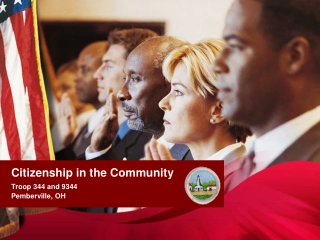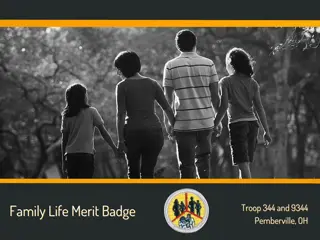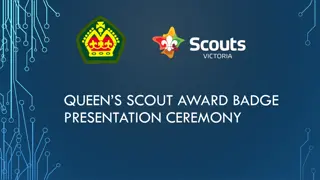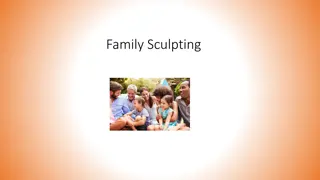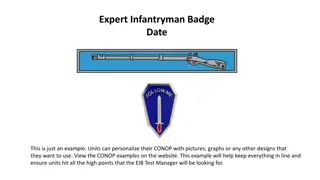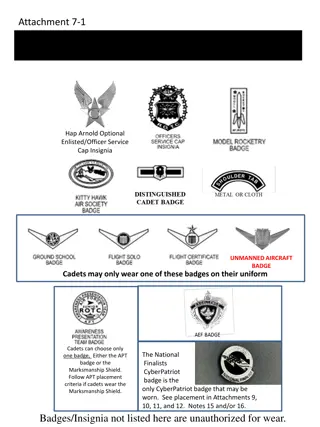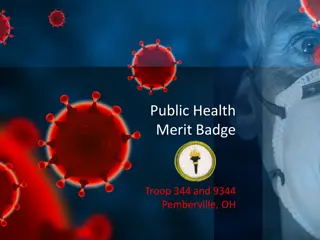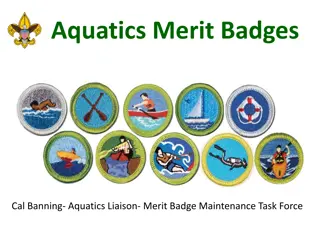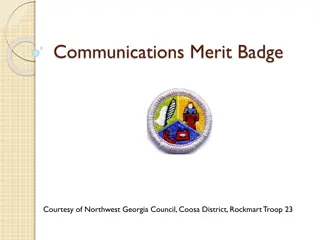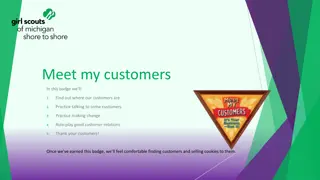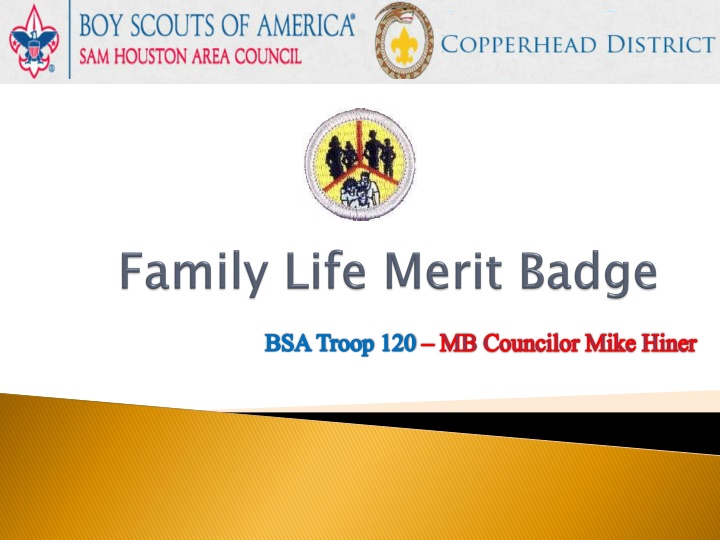
Importance of Family in Society
Understanding the significance of families is crucial for individuals and society. Families provide love, support, and a foundation for development. As a Scout, it's important to strengthen your family to contribute to a stronger community. Explore the different types of families and reflect on the values and roles within your own family unit.
Download Presentation

Please find below an Image/Link to download the presentation.
The content on the website is provided AS IS for your information and personal use only. It may not be sold, licensed, or shared on other websites without obtaining consent from the author. If you encounter any issues during the download, it is possible that the publisher has removed the file from their server.
You are allowed to download the files provided on this website for personal or commercial use, subject to the condition that they are used lawfully. All files are the property of their respective owners.
The content on the website is provided AS IS for your information and personal use only. It may not be sold, licensed, or shared on other websites without obtaining consent from the author.
E N D
Presentation Transcript
Prepare an outline on what a family is and discuss this with your Merit Badge Counselor. Tell why families are important to individuals and to society. Discuss how the actions of one member can affect other members.
The family is the basic unit of society and is important to both individuals and communities. A family is made up of people who care about one another. All members of a family give and receive love and support from the others. Family members reach out to one another and share both happy and sad times together. They talk and listen to one another, share ideas, thoughts and concerns. They share fun as well as sorrow and help heal one another s hurts.
Family is the foundation for physical, emotional, social, intellectual, and moral development. Mature family members teach the younger ones important skills like how to get along with others and how to know right from wrong. Communities and society care about families by creating laws and providing services to help families.
As a Scout, part of your duty is to do your best to make your family strong and help your family thrive. By doing this, you are helping to lay the foundation for a stronger community and society.
No two families are alike. Each family forms its own set of values and decides what is important to them. Discipline also varies among families.
Nuclear Family Father, Mother, Children Extended Family Grandparents, Aunts, Uncles, Cousins Single-Parent Family One parent with children Blended Family Stepparents, Stepbrothers, Stepsisters Adoptive Family Family with children not biologically linked to parents Childless Family Couple who does not have children
Think about your own family. Who are the members? Your family provides you with shelter, food, and clothing. They make you feel safe and loved. They want you to be the best person you can be. No matter what your age, you can make the most of your family life and help your family grow strong.
List several reasons why you are important to your family and discuss this with your parents and guardians and with you Merit Badge Counselor.
Positive reasons that you help to form and maintain your strong family Love Security Acceptance and respect Mutual trust Good relationship and communication skills Shared roles and responsibilities Cooperation and interdependence Time spent together Good management skills
Caring about how other family members feel, sharing their hurts, helping them solve problems, and being there for them at important times are just a few ways to show love. You can show love or your family through special words, deeds and actions such as not being afraid to say, I Love You , spending time with your family, doing favors for family members, listening to what they have to say, being patient, and doing things without being asked.
Security refers to physical and psychological safety. Receiving encouragement, guidance, and training from the family makes family members feel secure. People feel secure when they know that their physical needs are being met and that they are protected and safe from harm.
No two people are alike. No one else is like you. Your are special! Part of growing up is learning to accept and respect yourself and others. It is important to recognize that each person has strengths and limitations. Each person has some talents, gifts, or strengths that make them unique. Everyone should respect these qualities and understand how they can make POSITIVE CONTRIBUTIONS to Family Life.
Trust is something that must be earned. You can earn trust by keeping your word and by being truthful, reliable, unselfish, and caring.
Good Communication misunderstandings and involves both listening and talking. People usually are better at communicating their thoughts rather than their feelings. Communicating feelings help family members better understand one another as opposed to using methods such as blaming, shouting, denying, bottling feelings inside, or even physical abuse. Learning how to communicate feelings takes work and practice. Good Communication helps prevent
Criticizing No one likes ridicule, sarcasm, or negative comments. These hurt and put down a person. Judging Quick judgments cause tension and close communication channels. Labeling Assigning negative labels such as lazy, sloppy, slow, mean, and stupid to someone is hurtful. Sometimes people begin to live up to those labels. When Communication is good, people say what they mean to say. There are no hidden meanings to guess or worry about. Unclear communication creates insecurity.
Think of all responsibilities of running a home and raising a family. Doing your share in the family will help make things run more smoothly. A good way to show your responsibility and commitment to your family is to do your chores without complaining or being asked. When you carry out these responsibilities, you are letting the family know that you love them and that they can depend on you.
The more each family member cooperates by participating in the management of the home, the more smoothly things will go. Here is a list of things you can do to help: Your Room make your bed, put clothes and belongings away, clean floor Family Meals set/clear table, help prepare the meal, carry in/put away groceries, wash, dry and put away dishes, sweep floor after the meals General Chores take out trash, wash car, help with home repairs, clean bathroom, dust/vacuum/mop, help with siblings/grandparents, pet care Laundry wash, fold, put away laundry, iron clothes, sew buttons Yard Work Clean up/mow yard, trim shrubs, shovel snow, plant and care for a family garden, water plants, paint when needed Your Room Family Meals General Chores Laundry Yard Work
Effectively managing a family requires balancing time and money. It means taking the time to do what needs to be done so that family will have time to do fun things together. It means making responsible financial decisions that do not put the family at risk.
Stop and ask yourself, What is the best use of my time right now? Be flexible and make adjustments Ask for help or instructions Eliminate low-priority items from to do list Determine important priorities. Be prepared to say NO- to yourself, family friends to things that might interfere with your schoolwork.
Develop a budget. It is a plan for spending and saving money Prioritize Need Limit impulse purchases. Don t buy groceries when hungry Watch out for check out stands Don t try to buy something because your friends have it Avoid shopping under the influence of strong emotion. Don t shop when angry, hurt, or disappointed Stay within your budget limits. Need vs vs Want Want
Prepare a list of regular home duties or chores (at least five) and do them for 90 days. Keep a record of how often you do each of them.
Day Completed Home Duties 1 Your Room 2 Family Meals 3 General Chores 4 Laundry 5 Yard Work S M T W Th F S *Bed, Clothes, Stuff x x x *Set, Clear, Dishes x x x x x x x *Trash, Bathroom Pet x x x x x *Fold, Iron, Put Away x x x x x *Rake, Mow, Water x
With the approval of your parents or guardians and your Merit Badge Counselor, decide on and carry out a project that you would do around the home that would benefit your family.
Ideas: Clean and organize a storage area Paint a room Prepare a family meal on your own Clean and organize the kitchen Clean the refrigerator and stove Take down window treatments and wash the windows Clean the garage, attic or basement Create a home video or digital scrapbook of family events
Plan and carry out a project that involves the participation of your family. After completing the project, discuss the following with your Merit Badge Counselor: A. The objective or goal of the project B. How individual members of your family participated C. The results of the project
Prepare a weeks worth of meals together to freeze for future use Plan, prepare and conduct a family reunion or party for a special event Plan and conduct a garage sale Help out at a food bank, conduct food drive, clothing drive, stock shelves Assist in an animal shelter Start a family garden
Be sure you know the objective or goal: What needs to be done? Do you want to benefit your family, neighborhood or community? Decide what to do, why you are doing it? Get permission from group or agency, if necessary Be sure you have all the supplies you will need
Before you begin, answer the following questions. What activity will you do? How will you do it? Who will do what? When will it be done?
What did you accomplish? How did doing this make you and your family feel? What did this mean for the group? What could you do in the future?
Do the following: A. Discuss with your Merit Badge Counselor how to plan and carry out a family meeting. B. After this discussion, plan and carry out a family meeting to include the following subjects: 1) Avoiding substance abuse, including tobacco, alcohol, and drugs, all of which negatively affect your health and well- being 2) Understanding the growing-up process and how body changes, and making responsible decisions dealing with sex 3) Personal and family finances 4) A crisis situation within your family 5) The effect of technology on your family 6) Good etiquette and manners *Discussion of each of the above subjects will *Discussion of each of the above subjects will likely (and SHOULD) carry over to more than likely (and SHOULD) carry over to more than one family meeting. one family meeting.
Guidelines All family members who live in the household should be invited Set a day, time and play in advance One person should lead the discussion, rotate this position at different meetings among all members who are old enough One person should keep notes Develop an agenda of what is going to be discussed during the meeting. Keep an open mind that any aspects of the family life are open for discussion The topics should be about situations and NOT individuals Listen without interrupting, treat each other with respect
Discuss the following with your counselor: A. Your understanding of what makes an effective father and why, and your thoughts on the father s role in the family. B. Your understanding of the responsibilities of a parent.
You will be your childs role model. You must have a good relationship with your wife, be ready to parent, and really want to have children. You will need to be involved in your child s life and concerned with his or her physical, emotional, social, moral well-being.
It is one of the most exciting things you will ever do. You will have joys, laughter, worry and sadness. Factors to determine readiness for parenting: Want a Child Be in good health Be emotionally mature Be partners in a strong marriage Have enough time, space, and money to raise a child Addressing ALL these factors will give you both a strong foundation for starting a family.
Take care of physical needs Provide love and emotional support Offer guidance and discipline Provide protection Provide economic support Taking care of health-care needs Sharing your time, talent and ideas Teaching independence & responsibility Providing educational & recreational experiences Teaching values & social skills Nurturing spiritual well-being Preserving Cultural traditions
___ 1. What is family? ___ 2. Why are you important to your family? ___ 3. Make chore list and do for 90 days. ___ 4. Do a home project for your family. ___ 5a. Do home project w/family, discuss Goal ___ 5b-c. Discuss how family participated & results ___ 6a. Discuss how to carry out family meeting. ___ 6b. Have Family Meetings, cover the 6 topics ___ 7a. Discuss effective Father and role of Father. ___ 7b. Discuss the responsibilities of a parent. ___ In Class ___ At Home
Family Life Merit Badge Series Boy Scouts of America Don t Forget:


